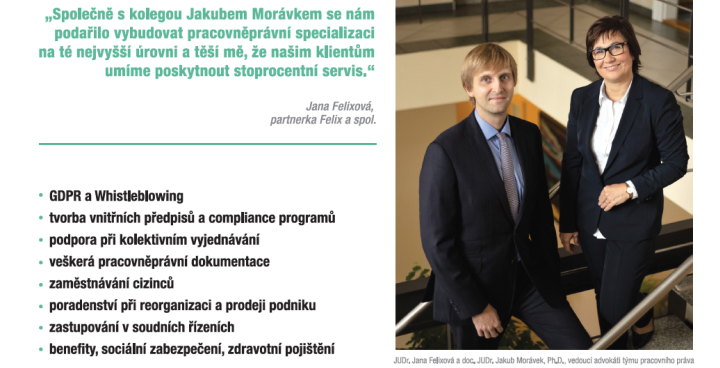12.10.2023 16:42
The amended to the Labor Code brings along substantial changes in the area of employment law. Signed by the President of the Republic last week, it will most likely come into effect as early as October 1st, 2023.

We have already informed you in the past about this recent amendment to the Labor Code which, among other things, changes the legal regulations surrounding work performed outside regular employment, rules for remote work, special rules for working conditions of certain employees, rules on the basis of which employees need to be informed about working and other conditions when their employment begins or when the form of employment changes as well as rules for service of documents related to employment, etc.
The amendment had a relatively difficult journey through the Parliament of the Czech Republic. At one point, it was returned to the Chamber of Deputies by the Senate with a request for several amendments. However, the Chamber rejected the Senate’s proposals and the amendment was adopted in its original form. The amendment was signed by the President of the Republic last week. This completed the legislative process.
The amendment (with exceptions such as the right to paid leave in connection with work performed outside employment) is to take effect on the first day of the month following its publication in the Collection of Laws. Whether this will happen on October 1st 2023 or November 1st 2023 de facto depends on the terms of the law’s promulgation being agreed with the Ministry of the Interior, which administers the Collection of Laws. We can assume, given the reasoning used to push the amendment through (the delay in transposing European law), that the law will be published in the Collection of Laws in September, i.e. it should take effect (and be followed) from October 1st 2023.
Although the transitional provisions of the Act allow for a certain transitional period in relation to some obligations of an administrative nature (in particular the information obligations, which will not have to be complied with immediately), the amendment overall provides for the changes to take full effect from the first day of its entry into effect.
In particular, we note that the amendment requires employees working remotely at the time of the amendment coming into effect to sign an agreement for remote work within one month of the amendment coming into effect, unless they already have such a contract (for example, if they work from home based on internal rules.)
Simply and broadly speaking, we recommend reviewing the following documents and any related processes in order to ensure compliance:
- the information to be provided to employees at the start of the employment contract/ agreement for work/agreement for working activity;
- the information to be provided to employees when the type of employment relationship changes in accordance with the previous point;
- the wording of the employment contract;
- the wording of the agreement for work;
- the wording of the agreement for working activity;
- the wording of the agreement and internal rules governing the performance of remote work;
- the rules on service of documents;
- the creation of an informed consent for the service of documents to the employee’s own hands by electronic mail;
- the establishment of rules and processes for the exercise of new rights gained by employees (like requesting regular employment when performing work under an agreement for work or agreement for work activity, requesting to work remotely, requesting a reduction and/or change of working hours by an employee entitled to special working conditions, etc.);
- rules relating to parental leave.
We are ready to provide you with an in-person consultation or to review and/or create any documentation affected or newly envisaged by the amendment.
This update was prepared by JUDr. Jakub Morávek, Ph.D